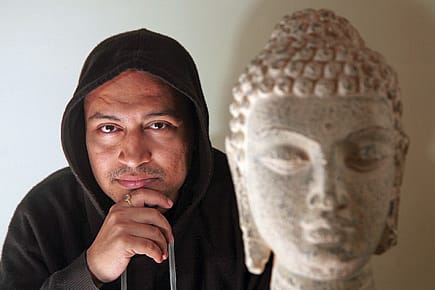Tips from the Fake IPL Player

In his first piece since he revealed himself, the Fake IPL Player explains what impersonating a cricketer teaches you about life.
LESSON ONE: LIFE ISN'T A WELL THOUGHT OUT STRATEGY
John Lennon was right: Life is what happens to you while you're busy making other plans. Fake IPL Player (FIP) wasn't the result of a strategy, a PowerPoint presentation, or a five-year vision statement. It was a late night germ, further developed over a hilarious GTalk conversation with a friend one day before IPL-2. We discussed the persona of a fringe player, 'Faceless IPL Player' at the time, in the most controversial team—who gets scoops from his buddies in other teams and puts it on his blog.
Not having a plan worked well for me. Having a sense of adventure was an added bonus.
LESSON TWO: GOD WILL TEST YOUR CONVICTION
After the success of the blog, I had to make a decision about whether to continue running my business or become a writer. A few years earlier, when I was trying to get a foothold in television and films, I was offered a marketing consultancy project with Hewlett-Packard with money I had never seen before. I accepted it thinking I'd do it for six months and then return to what I really wanted to do.
AIming High
20 Feb 2026 - Vol 04 | Issue 59
India joins the Artificial Intelligence revolution with gusto
Those six months turned into 36 months. Finally, just when I had resigned to my fate of living a life of doing something I wouldn't necessarily choose to do, I started the blog on a whim. At the end of it, I was faced with the same dilemma again: money or passion? I knew my conviction was being tested—probably for the last time. I chucked everything and plunged head-on into a writing career. There won't be a day in my life that I will regret this decision.
LESSON THREE: SACHIN TENDULKAR IS GOD
Fake IPL Player was my only brush with public adulation. Having experienced a little bit of it, I can say it's not good for the character. When people say things like "You're a genius" and "You rock", it can so easily go straight to your head. I started believing them. After a point I had to stop reading people's comments to maintain my sense of balance. Being anonymously famous gave me a sense of fame, but also allowed me to have a neutral perspective on it. And, oddly enough, it made me see where Tendulkar's true greatness lies. Being a demi-god for two decades and yet keeping your feet on the ground is a superhuman effort.
LESSON FOUR: LISTEN TO YOUR INSTINCTS
Starting the blog conformed to no logic, nor did continuing it when practical friends advised me to stop for fear of repercussions, legal or otherwise, from very powerful people. Business-oriented friends said that I should convert FIP into a business model—a franchise, a brand, a cricket satire website, a magazine, but I chose to write a book instead. At the start of the next season, I instinctively knew that the trick couldn't be repeated, though everyone expected the blog to return. Our instinct knows more than we give it credit for.
LESSON FIVE: ENJOY THE RIDE
Some posts flowed straight from my heart, making me laugh while I was writing them. They turned out to be the most popular ones on the blog. There were others that I forced myself to write, to think hard about what people expected, where I tried to anticipate what would titillate my readers. These were panned by readers. The first chapter of the book I wrote was so bad that I cringed when I read it. I realised I was again forcing myself to play to the galleries, give what I thought readers wanted. That's when a friend told me, "If you enjoy writing it, people will enjoy reading it." It became my guiding principle from then on, making the process more pleasurable than anything else I have ever felt in my life.
